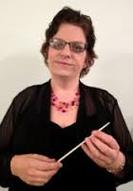
Review by Helen Brind LRSM - Musical Director Weymouth Choral Society and Barclays House Choir
A concert featuring ‘The Music of Vanessa Young’ on Saturday 4 October 2014 proved to be a delightful evening showcasing the talents of this versatile poet, musician and artist. Through a collection of songs and instrumental interludes, performed by two highly respected and talented local musicians, Duncan Honeybourne (piano) and Abbi Temple (soprano), the audience was transported through a range of themes and reflections. The songs (many of which were premiered at the concert) were sympathetically and effectively arranged by Louise Dukes and the programme was interwoven with Vanessa’s poems read by Richard Jones-Barry who introduced and linked the items most eloquently. What was clear, as always with Vanessa’s work, was the great sincerity with which she crafts the lyrics and melodies to her songs, weaving through a rich tapestry of human emotion.
Vanessa is a skilled word-painter, capturing the mood of her lyrics in her musical phrase. In ‘The Slippy Estuary’ for example, a dance-like rhythm reflects the light-hearted care-free aspect of the summer season; a rich legato phrase portrays the constancy of the river flowing towards the sea. The expressive potential of the human voice was also used effectively – requiring the soprano to access a low register gave effective sonority and gravitas, particularly in pieces such as ‘Battlefield Lament’ which expressed the tragedy of war. Duncan Honeybourne’s beautifully executed medley for piano, formed of three of Vanessa’s miniatures entitled ‘Sky Studies’, demonstrated the Impressionistic nature of her writing as the pictures of floating clouds, storm, rainfall and calm were clearly painted through the music.
Vanessa’s love of the countryside and the seascape is obviously a major inspiration to her work, but there were also some pieces that perhaps held more personal reflections on ‘love, longing and loss’ and which had a particular intensity and effectiveness. In ‘Don’t Speak’ Vanessa’s theme is the healing power of reconciliation after loss or separation. The music seemed to reflect the timeless aspect of its subject, a modern take on a Romantic ‘lieder’ or art song, its long legato phrases and use of the full range of the voice giving an intense energy and hope. Places holding personal meaning to the composer or those close to her were also the subject of songs of great beauty and poignancy, particularly ‘Amrum My Island’ and ‘Sweet Osmington’, which reflects on the burial place of a loved one. The concert finished with a delightful piece, ‘Flint Meadow’, taking the audience to a view obviously much-loved by Vanessa – overlooking the Fleet and Chesil beach. This simple, charming song formed a perfect ending to the evening.
A concert featuring ‘The Music of Vanessa Young’ on Saturday 4 October 2014 proved to be a delightful evening showcasing the talents of this versatile poet, musician and artist. Through a collection of songs and instrumental interludes, performed by two highly respected and talented local musicians, Duncan Honeybourne (piano) and Abbi Temple (soprano), the audience was transported through a range of themes and reflections. The songs (many of which were premiered at the concert) were sympathetically and effectively arranged by Louise Dukes and the programme was interwoven with Vanessa’s poems read by Richard Jones-Barry who introduced and linked the items most eloquently. What was clear, as always with Vanessa’s work, was the great sincerity with which she crafts the lyrics and melodies to her songs, weaving through a rich tapestry of human emotion.
Vanessa is a skilled word-painter, capturing the mood of her lyrics in her musical phrase. In ‘The Slippy Estuary’ for example, a dance-like rhythm reflects the light-hearted care-free aspect of the summer season; a rich legato phrase portrays the constancy of the river flowing towards the sea. The expressive potential of the human voice was also used effectively – requiring the soprano to access a low register gave effective sonority and gravitas, particularly in pieces such as ‘Battlefield Lament’ which expressed the tragedy of war. Duncan Honeybourne’s beautifully executed medley for piano, formed of three of Vanessa’s miniatures entitled ‘Sky Studies’, demonstrated the Impressionistic nature of her writing as the pictures of floating clouds, storm, rainfall and calm were clearly painted through the music.
Vanessa’s love of the countryside and the seascape is obviously a major inspiration to her work, but there were also some pieces that perhaps held more personal reflections on ‘love, longing and loss’ and which had a particular intensity and effectiveness. In ‘Don’t Speak’ Vanessa’s theme is the healing power of reconciliation after loss or separation. The music seemed to reflect the timeless aspect of its subject, a modern take on a Romantic ‘lieder’ or art song, its long legato phrases and use of the full range of the voice giving an intense energy and hope. Places holding personal meaning to the composer or those close to her were also the subject of songs of great beauty and poignancy, particularly ‘Amrum My Island’ and ‘Sweet Osmington’, which reflects on the burial place of a loved one. The concert finished with a delightful piece, ‘Flint Meadow’, taking the audience to a view obviously much-loved by Vanessa – overlooking the Fleet and Chesil beach. This simple, charming song formed a perfect ending to the evening.